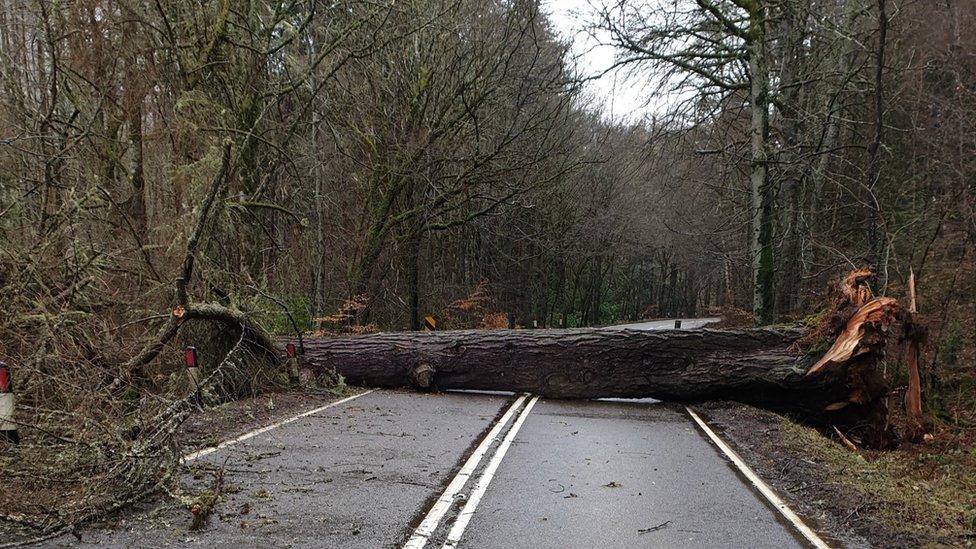Storm Dennis clean-up goes on in Newcastleton
- Published
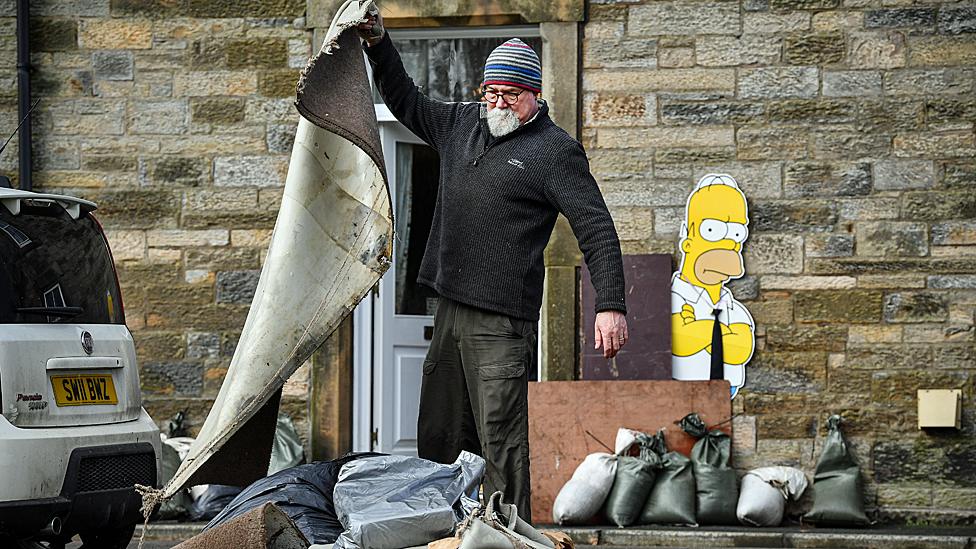
About 80 properties were affected by flooding in Newcastleton at the weekend
The clean-up operation is continuing in a Borders village badly hit by flooding during Storm Dennis.
Newcastleton community council's vice-chairman Greg Cuthbert said they were "lucky" that no lives had been lost.
About 80 houses in the village were affected as the worst of the conditions swept through late on Saturday.
Mr Cuthbert told the BBC's Good Morning Scotland programme it was "the fastest flowing water you have ever seen".
Many parts of Scotland were affected as Storm Dennis swept across the country.
The harbour on the island of Easdale in Argyll has been temporarily closed after tonnes of stone was washed into it.
A digger will need to be taken over from the mainland to clear away the slate.
Easdale is one of the Slate Islands in the Firth of Lorn where stone was quarried for roofing slate. The island, which has a population of about 60 people, is famous for holding the World Stone Skimming Championships.
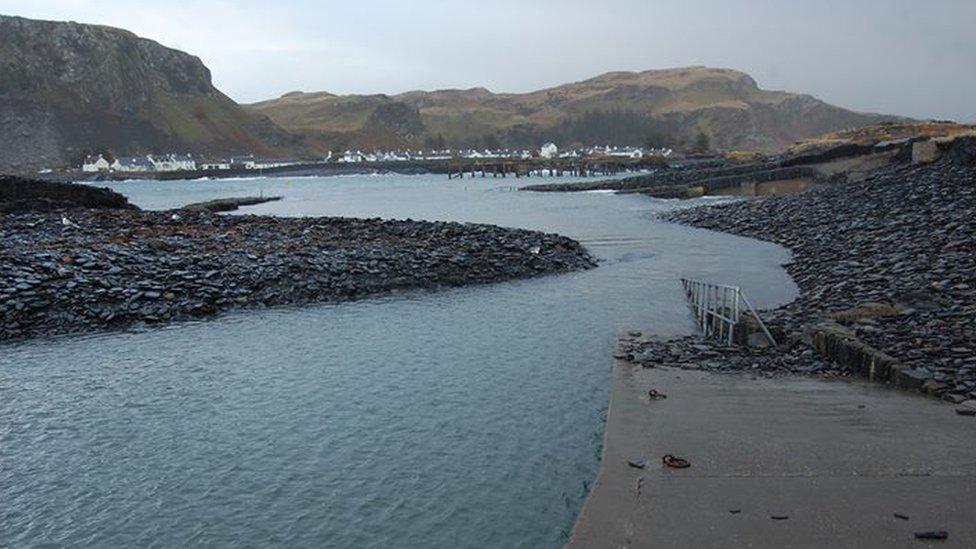
Tonnes of slate has been washed into the entrance of Easdale harbour
Argyll and Bute Council is making arrangements to clear away the debris from the harbour's entrance. It said it had "stand-in" boat to take people to and from the island while Easdale's ferry service is suspended.
A spokeswoman said: "Arrangements have also been made with a local boat owner to put a landing craft on standby should it be needed in an emergency."
Slate being washed into the harbour has been a problem before, and the most recently incident follows storms Ciara and Dennis.
Among the issues at the weekend were:
A fallen tree blocking the A82 north of Invermoriston for a time
The final night of Aberdeen's Spectra Festival was cancelled
A section of railway line was shut as water spilled from an aqueduct onto overhead power lines in Renfrewshire
A yellow Met Office weather warning was in place until 11:00 on Monday.
A fresh alert for snow and ice has also been issued for parts of the country overnight into Tuesday.
Newcastleton - one of the places worst hit by the conditions - was still coming to terms with the situation.
"It was the speed of the storm, it came through so quickly," said Mr Cuthbert.
"It was a couple of hours of the fastest flowing water you have ever seen.
"You couldn't outrun it, you couldn't outdrive it, nothing like that, it just came so quick."
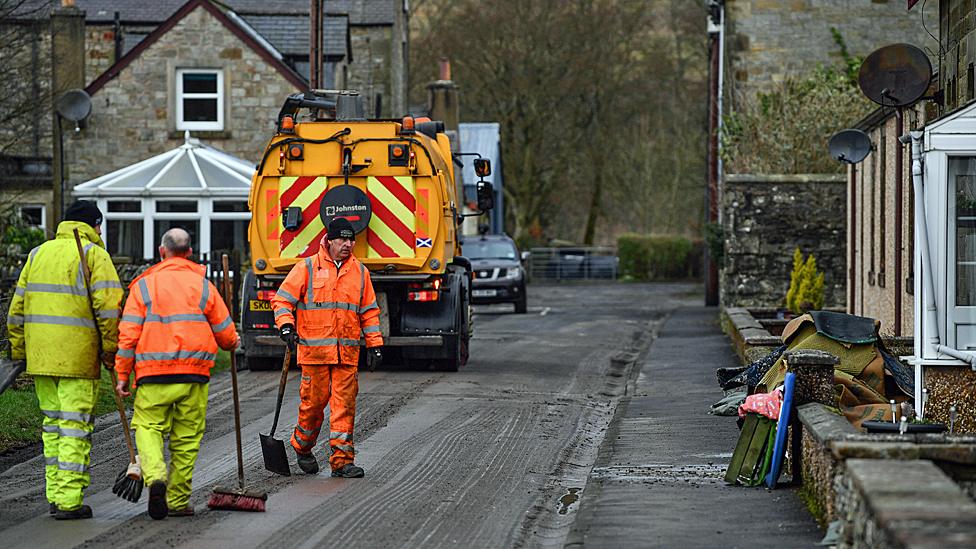
Greg Cuthbert said it would take a long time for elderly residents to get over the incident
He said the village had been particularly busy - with an extra 200 to 300 people attending a sporting event - when the storm struck.
"There was water everywhere, there were real life and death issues, people were caught on the roads, people caught in their houses - children taken through windows," he said.
"It was a very, very frightening thing for a small, rural community - we are 25 miles from the nearest help - and the roads were closed so nobody could get in.
"It was a difficult time."
He said the local resilience team and retained fire service had reacted quickly along with local people rallying round to help.
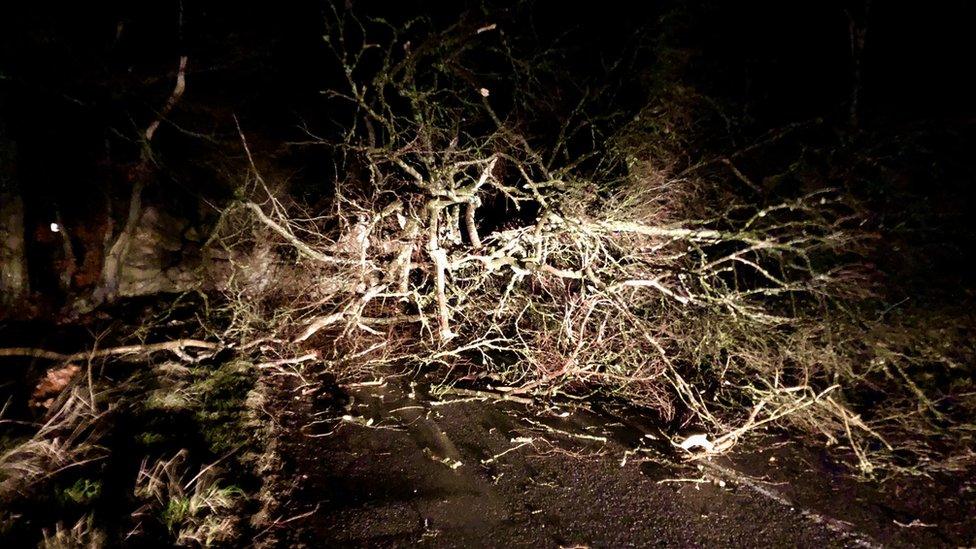
Storm Dennis caused damage and disruption across Scotland, including in the Aberdeenshire village of Fettercairn
However, he said a "large proportion" of the village had been affected.
"It is going to take a long time for a lot of the elderly in this village to get over it," he said.
Mr Cuthbert said they were in the process of consultation on some sort of flood protection.
"Having some form of barrier would definitely give us time to help the vulnerable," he said. "It is happening more often.
"We were very lucky on Saturday that no-one's life was lost," he added.
'Working tirelessly'
Scottish Borders Council said it was "working closely" with partners to support residents in the village in the aftermath of the storm.
First minister Nicola Sturgeon visited Hawick to see for herself some of the damage caused by the storm.
She paid tribute to everyone who was "working tirelessly" at an "extremely difficult time".
She added that reducing flood risk was a priority for the Scottish government which was why it was providing £42m each year to help invest in protection measures.
- Published17 February 2020
